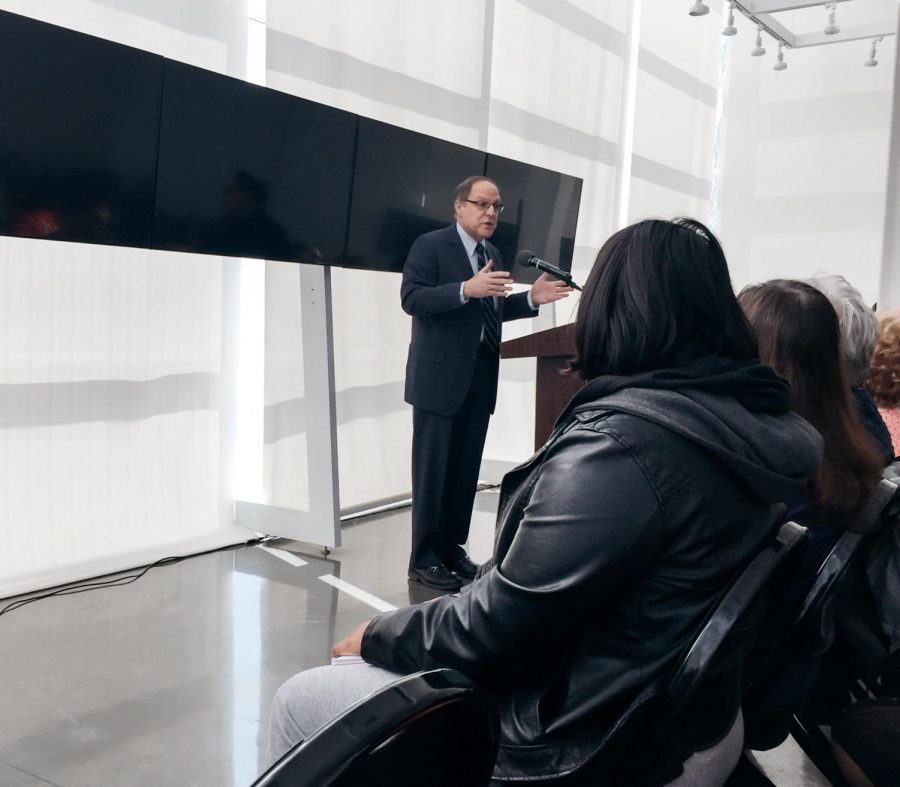NYU Professor Challenges Holocaust Generalizations
NYU professor David Engel presenting his lecture “In the Shadow of Auschwitz: The Experience of Polish Jews under Nazi Occupation” at Queensborough Community College on Feb. 28.
March 1, 2018
David Engel, NYU Greenberg professor of Holocaust Studies and chair of Hebrew and Judaic Studies, lectured on Wednesday. Feb. 28 at Queensborough Community College’s Kupferberg Holocaust Center. The lecture, titled “In the Shadow of Auschwitz: The Experience of Polish Jews under Nazi Occupation”, was the fifth event in an eight-part series called “Complicity and Collaboration in the Holocaust.”
From the start of the lecture, Engel said that he would avoid sharing a stereotypical view of the Holocaust and of Jews in Poland. He instead emphasized individual actions over broad generalizations.
“I ask you to consider all of [the characters in my stories] as individuals only, not in any way as representatives of the national or religious groups from which they can be identified,” Engel said. “…Many of these people performed deeds that we would likely label today as evil. That’s a problem because that label can impede understanding what is most important in the story I’m about to tell.”
Engel stated that humans are prone to falsify history so as to dichotomize those who are good and those who are evil. This creates many generalizations about the Holocaust and oversimplifies its complexity. Engel made his point by recounting the history of a Jewish Pole named Calek Perechodnik, who forced his own neighbors, community and then his own family onto cattle cars, sending them off to their deaths. He later expressed deep regret in a number of literary pieces.
According to Engel, the Jewish Historical Commission was interested in publishing Perechodnik’s work but was worried about its content and thus made its own modifications. Perechodnik’s writing offers an example of the moral complexities of individuals involved in the Holocaust.
“Most of the ones [Perechodnik] described, Poles, Jews and even at times, Germans were morally ambiguous figures, not either clearly good or clearly evil,” Engel said. “Evil acts, when they occurred, were just as often the result of momentary thoughtlessness … they could be altogether unremarkable acts of which anyone – Pole, Jew, aristocrat, commoner, liberal, reactionary, atheist, believer – was capable, without necessarily embodying evil in the process.”
A lively Q&A period followed the lecture. A couple adults made generalizations, which Engel called out and corrected.
“Ma’am, with all due respect, what you have said is riddled with inaccuracies and is largely the result of ignorance,” Engel said in response to one comment made by a woman who attended. “The thought that all 28 million of those ethnic Poles acted as one is absurd on the face of it. Show me any group of 28 million or 2.8 million or 280,000 or 28,000 or 2,800 people where everyone thinks and acts alike and observes a collective characterization, and I will be utterly amazed. It doesn’t happen.”
Queensborough Community College student Katherine Ramnarie came away from the lecture with the understanding that blanket generalizations are harmful in discussions around the Holocaust. She noticed a discrepancy between different generations’ impressions of the time period.
“I think the most important thing I got out of this today honestly was … how an older generation can be so used to having this ignorant kind of view” Ramnarie said, “And then how this younger generation … [does not] want to blame someone in a sense – we want to just understand.”
Email Darcey Pittman at [email protected].


























































































































































